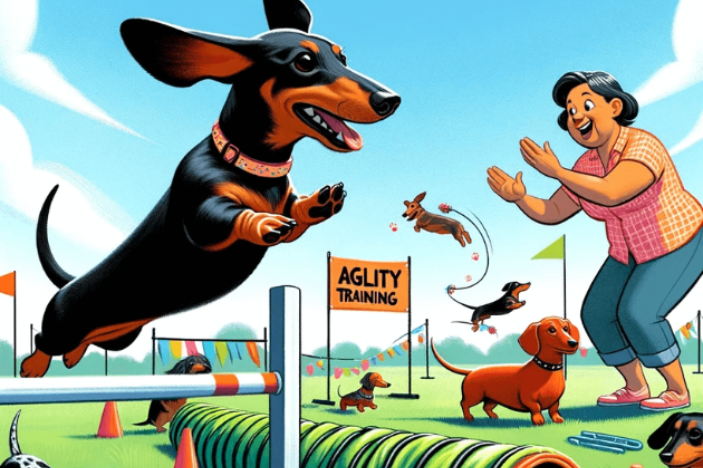Dachshunds are known for their deep barks, which can be heard a mile away. This characteristic is due in part to the dachshund’s long snout and specially adapted ear canal.
Their barking sound is also enhanced by the fact that they primarily communicate through body language and scent rather than speech.
Dachshunds are known for their vocal nature and can make a variety of barking sounds. Here are some common types of barking sounds that dachshunds make:
- Alert barks – These barks are sharp and short and are used to signal when something is amiss or when they perceive a threat.
- Excitement barks – These barks are high-pitched and often come in a series. Dachshunds use these barks when they are happy or excited about something, such as going for a walk or getting a treat.
- Aggression barks – These barks are deep and aggressive in tone and are used when a dachshund feels threatened or is in defensive mode.
- Attention-seeking barks – These barks are repetitive and insistent and are used when a dachshund wants attention or is feeling lonely.
It’s important to understand the different types of barks and what they mean to better communicate with your dachshund and address their needs
Do Dachshunds bark loudly?
Dachshunds are generally known to be quite vocal and can bark loudly. Their loud barks can sometimes be surprising given their small size, but it’s not uncommon for them to bark loudly and persistently if they feel threatened or are trying to alert their owner to something.
However, like with any dog breed, the loudness of their barking can vary from individual to individual depending on factors such as their temperament, training, and environment. Proper training and socialization can help reduce excessive barking and teach your dachshund to bark less and more appropriately.
Why do Dachshunds have deep barks?
Dachshunds have a deep bark compared to other small dog breeds because they were originally bred as hunting dogs.
Their deep, loud bark was useful when hunting animals like badgers, foxes, and rabbits, as it allowed their owners to locate them in dense foliage or underground burrows. Over time, this trait has been retained and is now a characteristic of the breed.
In addition to their breeding, a dachshund’s deep bark can also be influenced by their individual personality and temperament. Some dachshunds may have a naturally deep bark, while others may have a higher-pitched bark.
Regardless of their specific bark tone, it’s important to train and socialize your dachshund to ensure that they bark appropriately and don’t become excessive or disruptive.
Why do Dachshunds bark so much at night?
Dachshunds, like many other breeds, may bark at night for a variety of reasons.
Some common reasons why dachshunds bark at night include:
Attention-seeking: Dachshunds are social dogs and may bark at night to get attention from their owners or to be let into their sleeping area.
Separation anxiety: Dachshunds may become anxious when left alone at night, leading to excessive barking.
Intruders: Dachshunds are protective of their homes and may bark at night if they sense a potential intruder or strange noises outside.
Medical issues: Sometimes, excessive barking at night can be a sign of underlying medical issues, such as pain, anxiety, or a need to go outside.
If your dachshund is barking excessively at night, it’s important to identify the underlying cause and address it appropriately.
This may involve training and socialization, addressing any medical issues, or creating a calm and secure sleeping environment for your dachshund.
Consulting with a veterinarian or professional dog trainer can also be helpful in addressing excessive barking behavior
How do I stop my Dachshund from barking at night?
If your dachshund is barking excessively at night, there are several things you can do to help address the behavior:
Identify the cause: Determine why your dachshund is barking at night. If it’s due to separation anxiety, for example, addressing the root cause may help alleviate the barking behavior.
Provide a comfortable sleeping area: Make sure your Dachshund has a comfortable and secure sleeping area where they feel safe and calm.
Create a calm sleeping environment: Provide your dachshund with a comfortable and secure sleeping area, such as a crate or a designated sleeping space. Make sure the area is quiet and free from distractions.
Exercise your dachshund: Make sure your dachshund gets plenty of exercise during the day, so they are tired and more likely to sleep at night.
Use positive reinforcement: Reward your dachshund when they are quiet and calm at night. This can help reinforce good behavior and reduce excessive barking.
Consider professional help: If your dachshund’s barking behavior persists, consider seeking the help of a professional dog trainer or behaviorist who can work with you and your dachshund to address the behavior.
Train your Dachshund: Use positive reinforcement training techniques to teach your Dachshund to bark less at night. For example, reward them with a treat or praise when they are calm and quiet during the night.
Address any underlying medical issues: If your Dachshund’s barking at night is caused by an underlying medical issue, consult with your veterinarian to address the issue and develop a treatment plan.
Address separation anxiety: If your Dachshund is barking at night due to separation anxiety, consider gradually desensitizing them to your absence and providing them with comfort items such as a favorite toy or blanket.
Address boredom: Make sure your Dachshund is getting enough physical and mental stimulation during the day to prevent boredom, which can lead to excessive barking at night
It’s important to note that excessive barking at night may also be a sign of underlying medical issues, such as pain or anxiety. If the behavior persists or worsens, consult with a veterinarian to rule out any medical concerns
How do you calm a Dachshund?
Dachshunds are known for their lively personalities and high energy levels, but sometimes they may become anxious or agitated, and it’s important to know how to calm them down. Here are some tips on how to calm a Dachshund:
Give them a safe space: Dachshunds can sometimes become anxious or overwhelmed in unfamiliar or stimulating environments. Providing them with a safe space, such as a crate or a quiet room, can help them feel secure and calm down.
Use calming techniques: There are several techniques that can help calm a Dachshund, such as soft music, aromatherapy, and massage. Calming scents such as lavender or chamomile can also help to soothe them.
Engage them in a calming activity: Activities such as puzzle toys or obedience training can help engage a Dachshund’s mind and help them relax. Playing with them or going for a walk can also help them burn off excess energy and feel calmer.
Provide reassurance: Sometimes all a Dachshund needs is some reassurance and affection from its owner. Petting them or holding them can help them feel secure and calm them down.
Consult with a professional: If your Dachshund’s anxiety or agitation is persistent or severe, it may be helpful to consult with a professional dog trainer or behaviorist to develop a comprehensive treatment plan.
It’s important to be patient and understanding when trying to calm a Dachshund, and to provide them with a consistent and safe environment. By using these techniques and providing them with the appropriate care and attention, you can help your Dachshund feel calmer and more relaxed.
Do dogs have nightmares?
It’s possible that dogs can have nightmares, just as humans do. Dogs have similar sleep patterns to humans, including periods of deep sleep and REM (rapid eye movement) sleep. During REM sleep, which is associated with dreaming in humans, dogs may twitch, move their legs, and make noises, suggesting that they are experiencing some form of dream state.
While we can’t know for sure what a dog is dreaming about, it’s possible that it may experience nightmares or other unpleasant dreams. Signs that a dog may be having a nightmare include whimpering, growling, or crying in their sleep, as well as restlessness and sudden movements.
However, it’s important to note that not all vocalizations or movements during sleep indicate a nightmare, as dogs may also dream about positive experiences, such as playing or running.
If you’re concerned about your dog’s sleep behavior, it’s always a good idea to consult with a veterinarian or animal behaviorist to rule out any underlying health issues or behavioral problems
Conclusion
Today we just want to share 10 reasons why Dachshunds bark so much! Do we hope you now understand where all this barking comes from? They can’t tell us if they’re angry, but they sure let us hear their joy with their squeals of joy every time we return home. We hope this post helped answer some of your questions! If he doesn’t like making funny faces, don’t worry, buy another toy for your dog to play with and enjoy a quiet evening together!




